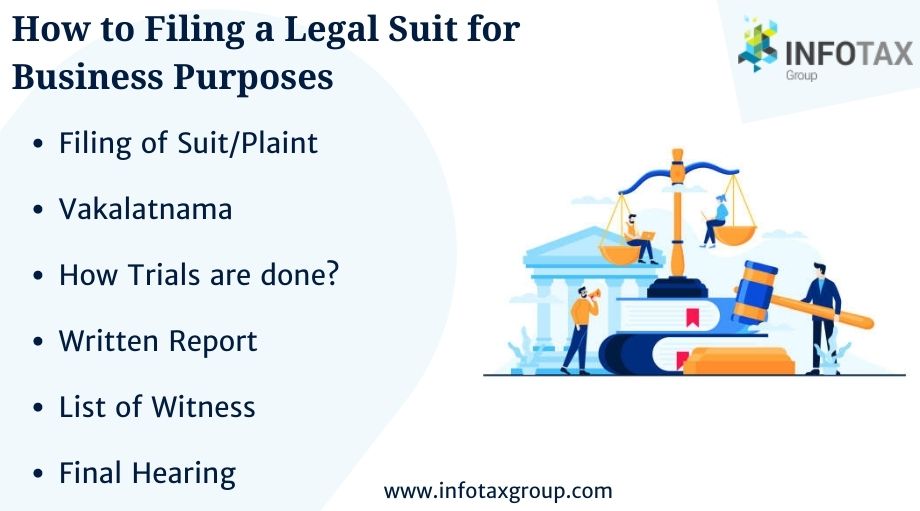Do you know how to filing a legal suit for business purposes? If not, then we are here to help you with a step by step guide. Certainly, there are a number of aims that a person wants to sue a firm. Moreover, just like these reasons, there are lots of rules based on which you can file a claim.
To make it clear, the process of suing a firm will differ. More importantly, it relies upon the type of firm, laws, facts, and the legal points that a case a based on. Also, there are so many other things that a legal suit covers in its process.
Further, in this blog, we will guide you on how to filing a legal suit for business purposes. So, let’s get all the details one by one.
1. Filing of Suit/Plaint
: – Above all, the first step of this action is to file a plaint. It is a written plaint. Firstly, the one-party who files the case refers to the plaintiff. Secondly, the party against whom the case is filed refers as a defendant. In addition, there are a few things that a suit or plain covers.
- Name of Court
- Name and Addresses of both Parties
- A brief report telling sections and orders under which they file the case
- Main details and other assents by the plaintiff
- Verification papers saying that all the contents shared by the client are true and correct
- Send a notice to the firm, prepare the case, gather the proof, and pay the fees
Most importantly, these are a few things that are vital in the first steps of a legal suit. Let’s check the next step.
2. Vakalatnama
: – Now, is the Vakalatnama. To clarify, it is a written paper by which the party filing the suit hires and allows the lawyer to serve their case on their behalf. However, the client can also stand for their own case in any court. And, in this case, they do not need a Vakalatnama.
Now, let’s check what terms a Vakalatnama cover.
- The client cannot hold the lawyer liable for any ruling
- The client will bear all the costs of a court trial
- The lawyer can hold the papers if the client does not pay the fees
- The client is free to release the lawyer at any stage of the case
- The lawyer has the right to make decisions on the court during the trial in the best care of the client
Certainly, these were a few things that you must view while filing a legal suit for business purposes.
3. How Trials are done?
: – This is to say, on the first day of the case trial, if the court finds that there are some merits in the case, they will issue a notice to the other party to submit their points and fix a date. Further, when they issue a notice, the client needs to follow a rule. Let’s check.
- Pay the fees in the court for the steps
- File 2 copies of the case for each party in the court
- One of these copies shall send by post/register/courier and the other usual post
- The parties shall do the filings within 7 days from the date of notice
Generally, this is how they hold the trial in court.
4. Written Report
: – Likewise, here is the next step, let’s check the details of this point.
- The party must turn up in the court on the date laid down in the notice
- Before the notice date, the defender needs to record his written report as per the date and details given by the court
- The written report shall deny the claims that are false
- Claims that are not denied thought to be admitted
- This report shall hold the verification from the client stating the all the points in the report are true and correct
- The client shall file the report within 30 days
- And, after seeking approval from the court, it can take 90 days
These are the big things about the written reports.
5. List of Witness
: – Here, we need to check the major points about the witness list.
- All the witnesses (to bring and test) have to turn up in the court
- Both the parties shall file a list of witnesses within 15 days or a fixed time given by the court
- Both the parties can call the witnesses on their own or the court can call them
- If the court needs to send an order to any witness, the party shall pay a “diet money” to bear the cost
- The court may fine the witness if hasn’t arrived in the court when asked
- On the final date, both the parties can review the witnesses
- After the cross-checking and taking and deny reports, the court will fix a final date of hearing
These are the main things both the parties shall know.
6. Final Hearing
: – Now comes the time of the final trial. Let’s check what it covers.
- On the final day of the trial, the court will hear all the reasons
- The reasons should be only about the main issues of the case
- Both the parties can alter their pleas before the final debate– with the consent of the court
- The court may deny hearing anything that is not in the plea
- In the last, the court will pass a final order on the same day or some other day fixed by the court
So, these are the final things that are vital to view on the final day of the trial.
In Conclusion
To sum up, in this blog we try to make clear the details and steps on how to filing a legal suit for business purposes. We explain all the details step by step. And, we hope that you get what you were seeking.







